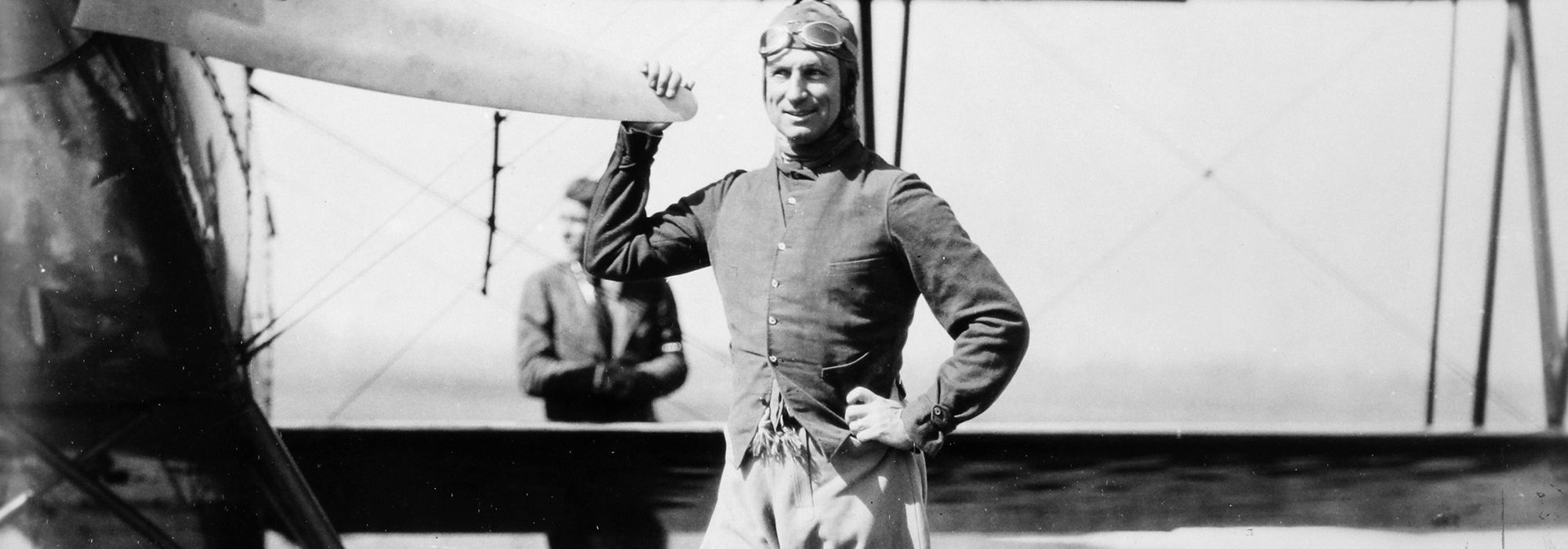Father of the U.S. Air Force.
William L. “Billy” Mitchell was born in Nice, France, in 1879, the son of a U.S. senator and Civil War veteran. Billy had the martial urge as well, so he enlisted in the Army when the Spanish-American War broke out. He saw no action in that war, but was then stationed in the Philippines during the insurrection there. Promoted to lieutenant, he was assigned to the Signal Corps.
As a signals officer, Mitchell served in Alaska, stringing telegraph lines through the wilderness. Operating with a small group in extremely harsh geographic and climatic conditions was to his liking. He learned independence, initiative, creativity, and leadership. These traits would make him a remarkable officer. It was those same traits that would get him in trouble.
Mitchell was present at the creation of airpower. When the Army bought its first airplane from the Wright Brothers in 1908, it was placed in the Signal Corps—at the time, Soldiers viewed the new invention strictly as a means of communication. Mitchell thought it had more to offer.
When the U.S. declared war against Germany in April 1917, Mitchell was already in Europe watching and learning how the French and British were conducting their air operations. When elements of the newly named Air Service began arriving in Europe, Mitchell was put in charge. Soon after, aviation pioneer Benjamin Foulois arrived in France. Sparks flew. The two generals instantly disliked and resented each other, an animosity that lasted for the rest of their lives.
The U.S. Commander, Gen. John J. Pershing, saw the trouble in his Air Service and called in an old friend and classmate, Maj. Gen. Mason Patrick, to straighten things out. Patrick put Mitchell in charge of air operations, and Foulois in control of logistics. In this role, Mitchell planned and commanded the largest air operation of the war at St. Mihiel in September 1918—nearly 1,500 Allied aircraft were under his control.
After the Armistice, Billy returned to the States, but unlike most officers, he was put in a position that allowed him to retain his one-star rank—Foulois, for example, had reverted to his permanent rank of major. From his position as Assistant Chief of Air Service, Mitchell shaped the future of American airpower. He was intimately involved in all aspects of Army aviation: procurement, training, doctrine, operations, and the grooming of future leaders.
He saw the U.S. Navy as the biggest threat. It was apparent to Soldiers and Sailors that airpower would play a major role in future wars. The value of airpower was never questioned; rather, the arguments were over who would control that airpower and how it would be used. Mitchell’s famous and dramatic bombing tests of 1921 and 1923 when his aircraft sank several battleships were instrumental in prodding the Navy into strengthening its own air arm—if only to ensure its aircraft were not absorbed into the Army. In a sense, one could say that Billy Mitchell was the father of naval aviation.
His ideas on how airpower would be used in war evolved over time. At first, he imagined another major land war with aircraft serving in a supporting role to the dominant land forces. This changed. Instead, he envisioned aircraft playing an independent and strategic role. To him, the enemy army had become a false target—the advent of aircraft could allow the true “vital centers” of a nation to be struck at the outset of a war by bombardment aircraft. He preached this idea tirelessly and became increasingly restive when Army superiors ignored his advice.
In March 1925, Mitchell’s tenure as Air Service deputy was not renewed. He thus lost his star, reverted to the rank of colonel, and was banished to San Antonio. He was hardly quieted. When the Navy lost the airship Shenandoah in a crash, Mitchell issued a press release accusing the leaders of the Army and Navy of nearly “treasonable administration” of the nation’s defense. As he no doubt expected, he was court-martialed for insubordination. The resulting trial was sensational, but the results were foregone. Mitchell was suspended for five years without pay; he elected to resign.
Years later the new Air Force would look at the court-marital to determine if its hero could be exonerated. But the facts were clear: Mitchell was guilty, even if for a worthy cause. He continued to agitate for airpower from retirement, and his ideas and example became a guiding light for countless Airmen who followed him. He died in February 1936 at the age of 56.
Mitchell wrote three important books, “Our Air Force” (Dutton, 1921), “Winged Defense” (Putnam, 1925) and “Skyways” (Lippincott, 1930), in which he expounded on his theories of airpower. The best biographies are by Alfred Hurley, “Billy Mitchell: Crusader for Air Power” (Franklin Watts, 1964) and Douglas Waller, “A Question of Loyalty” (Harper Collins, 2004).
